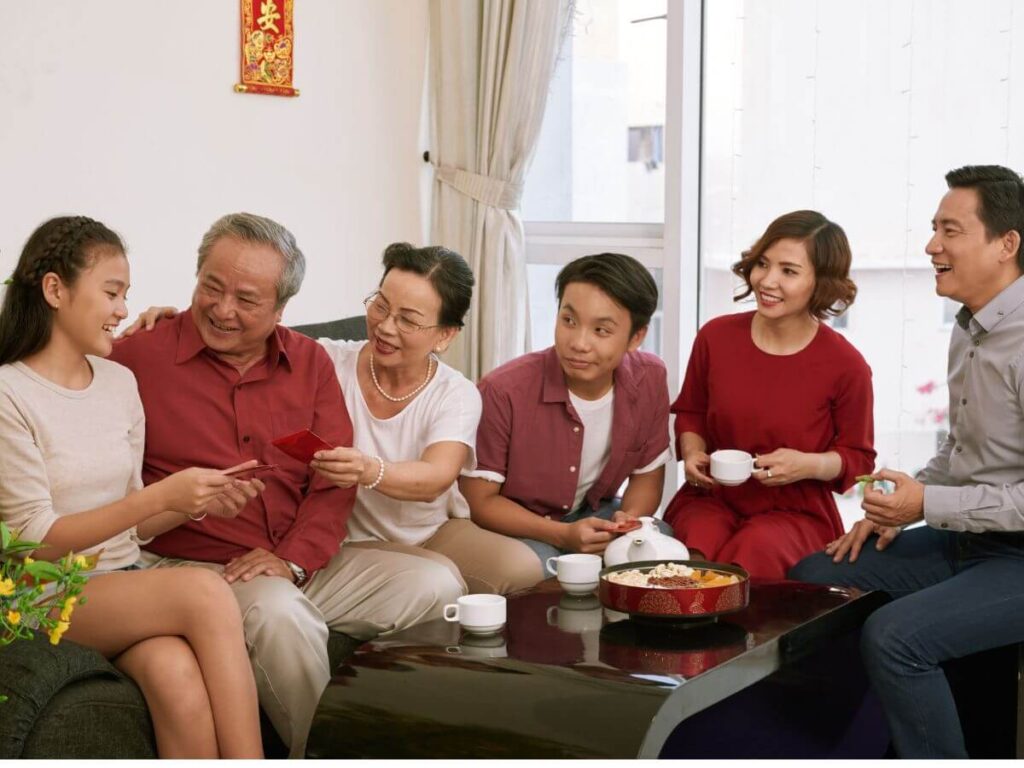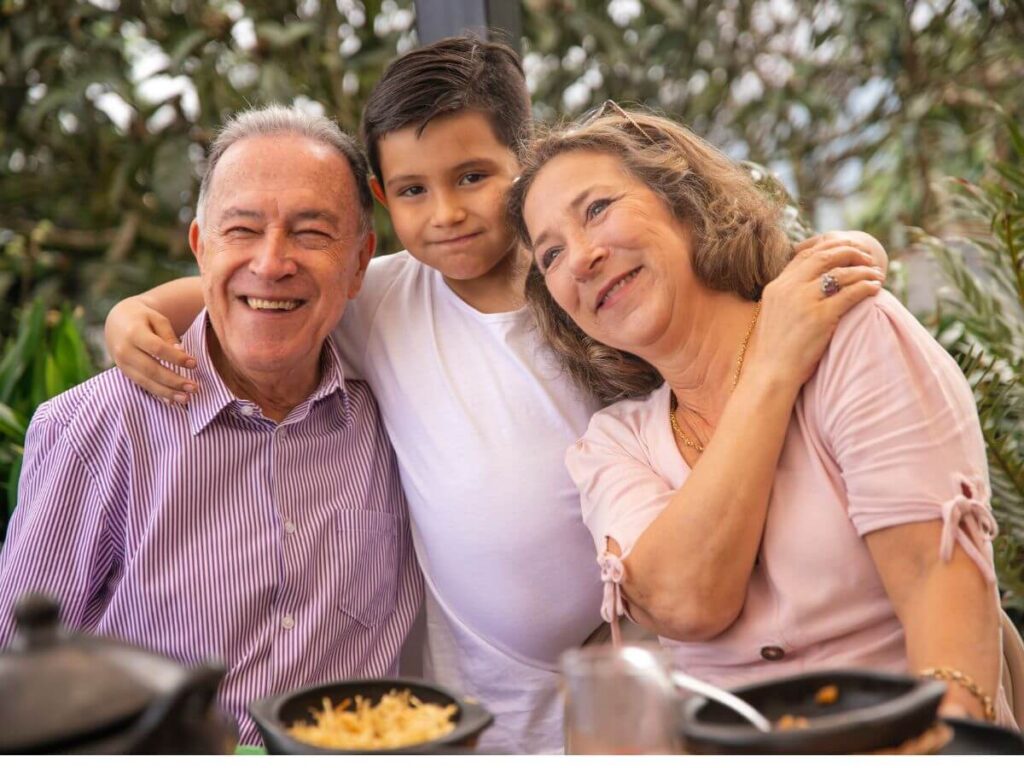
Grandma and Grandpa in Vietnamese: Pronunciation & Family Roles
Learn how to say grandma and grandpa in Vietnamese, where these essential family terms carry deep cultural significance. Discover the proper pronunciations, meanings, and contexts to address your Vietnamese grandparents with respect and cultural authenticity.

What Do the Words for Grandma and Grandpa Mean in Vietnamese Culture?
In Vietnamese culture, the words for grandparents are not simply terms of address but represent the important roles and positions of the elderly in the family. Specifically:
For Paternal Grandparents (bên nội):
- Grandpa (Ông nội): father’s father
- Grandma (Bà nội): father’s mother
For Maternal Grandparents (bên ngoại):
- Grandpa (Ông ngoại): mother’s father
- Grandma (Bà ngoại): mother’s mother
This distinction helps the family maintain structure and order. It also helps children better understand their origins through their paternal and maternal lines.
How Do You Correctly Pronounce Ông (Grandfather) and Bà (Grandmother) in Vietnamese?
Vietnamese has its own tones, and pronouncing words like “Mr.” and “Mrs.” correctly will help foreigners understand more about the intonation of this language. The similarity is that words about the father or mother such as “ngo” and “noi” have a heavy tone in Vietnamese. Foreigners need to lower the tone to read more accurately. Below are the pronunciations and meanings of each word:

How to Say and Use Bà Ngoại (Maternal Grandma) in Vietnamese?
- Vietnamese: “bà ngoại”
- Pronounced like: “bah ngoai”
- Meaning: “bà ngoại” refers to the woman who is the mother’s mother. This is a way of calling to show respect for the representative of the mother’s lineage.
How to Say and Use Ông Ngoại (Maternal Grandpa) in Vietnamese?
- Vietnamese: “ông ngoại”
- Pronounced like: “ohng ngoai”
- Meaning: “ông ngoại” refers to the mother’s father. The maternal grandfather is often the one who conveys family values from the mother’s side.
How to Say and Use Bà Nội (Paternal Grandma) in Vietnamese?
- Vietnamese: “bà nội”
- Pronounced like: “bah noy”
- Meaning: “bà nội” is the father’s mother, the woman representing the paternal side of the family, playing an important role in preserving the family’s traditions.
How to Say and Use Ông Nội (Paternal Grandpa) in Vietnamese?
- Vietnamese: “ông nội”
- Pronounced like: “ohng noy”
- Meaning: “ông nội” is the father’s father, the man representing the paternal side of the family. The grandfather is often the one who preserves and teaches family values.
Discover Related Guides: Vietnamese male names and Surnames: Complete Guide to Vietnamese Naming
What Are the Key Family Roles and Pronouns for Vietnamese Grandparents?

Pronouns in Vietnamese families are not simply calling names but also distinguishing the relationship between paternal and maternal sides very clearly. Below are common ways of addressing in Vietnamese families:
10 Essential Ways to Address Paternal Family Members in Vietnamese
- My father’s father is called “Ông nội” (Paternal Grandpa).
- My father’s mother is called “Bà nội” (Paternal Grandma).
- Father’s older brother is called “Bác” (Uncle).
- Father’s younger brother is called “Chú” (Uncle).
- Father’s uncle, paternal uncle, and paternal aunt are called: “Ông” (Grandpa).
- Father’s aunt, paternal aunt is called “Bà” (Grandma).
- The daughter, son of the uncle is called “Anh, Chị” (Brother, sister).
- The daughter, son of the uncle is called “Em”.
- The younger brother of the paternal grandparents is called “Ông Bác” (Grandpa).
- The younger sister of paternal grandparents is called “Bà Cô” (Grandma).
6 Common Terms for Addressing Maternal Family Members in Vietnamese
- Mother’s father is called “Ông ngoại” (Maternal Grandma).
- Mother’s mother is called “Bà ngoại” (Maternal grandpa).
- Mother’s older brother, paternal aunt are called “Cậu, dì” (Paternal uncle, paternal aunt).
- Mother’s younger brother, paternal aunt is called Cậu, dì” (Paternal uncle, paternal aunt).
- Your uncle’s wife will be called “mợ”.
- Your aunt’s husband will be called “dượng”.
This form of address is not only used in daily communication but also in family events, helping to distinguish the roles of each person in the family and showing respect to the elderly.
Frequently Asked Questions About Vietnamese Family Terms
How to call great-grandmother in Vietnamese?
- Great-Grandmother Maternal: This is the mother of the paternal grandmother, also known as “Bà cố ngoại”. This is the way to call the highest generation on the maternal side.
- Great-Grandmother Paternal: This is the mother of the paternal grandmother: “Bà cố nội’’. Similar to the paternal great-grandmother but on the paternal side.
How to call great-grandfather in Vietnamese?
- Great-Grandfather Maternal: The father of the maternal grandfather, “Ông cố ngoại” is the representative of the highest lineage on the maternal side.
- Great-Grandfather Paternal: The father of the paternal grandfather, “Ông cố nội” is similar to the paternal great-grandfather but on the paternal side.
Understanding how to address and pronounce the words “grandpa, grandma” or “grandpa, grandma” is an indispensable part of learning Vietnamese. With the pronunciation and clear distinction between family roles, you will not only communicate properly but also understand more about the profound traditional culture of the Vietnamese people.






